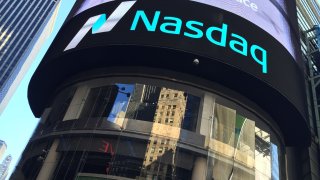
A painful month for high-growth stocks has punished the tech-heavy Nasdaq 100.
Bond yields have risen on higher inflation expectations over that stretch — high-growth stocks such as technology often fall during these times as their valuations are harder to justify.
The QQQ Nasdaq 100 ETF, which holds stocks such as Apple and Microsoft, has fallen 7% since an early September high. Roughly half of the ETF's stocks now trade below their 200-day moving average, a critical longer-term trend line.
Get DFW local news, weather forecasts and entertainment stories to your inbox. Sign up for NBC DFW newsletters.
"I definitely was one of the people sounding the alarm about stretched valuations," Gina Sanchez, chief market strategist at Lido Advisors, told CNBC's "Trading Nation" on Tuesday.
"The reason that a lot of people really weren't that concerned about technology was because technology had a good story going into the pandemic and then the pandemic gave it some rocket fuel and so then it did really well," she said.
The QQQ ETF rallied nearly 50% in 2020, buoyed during the initial stretch of the pandemic by a reliance on technology — those gains well surpassed the 16% gain for the S&P 500. The QQQ ETF peaked at more than 32 times forward earnings in September 2020.
Money Report
"Now here's the problem. As the rest of the economy has opened up, tech and communications just haven't had the same play, and that's 70% of the QQQs. And if you look all year as the reopening has occurred the QQQs have lagged the S&P 500, and that's just because there are other places right now to play the reopening," Sanchez said.
She says it's not "dead money" but will likely lag as investors search for better opportunities with "more reasonable and more sustainable" valuations.
Todd Gordon, founder of Inside Edge Capital Management, sees this as the typical cycle that impacts growth stocks when interest rates move up.
"But, don't make this mistake, we're still seeing growth outpace on relative strength. If you take that center S&P as the benchmark, growth is still in the last two months outperforming value," Gordon said during the same interview.
The IVW growth ETF, which holds stocks with a premium valuation, has risen 16% this year. The IVE value ETF, by comparison, is up 14% — these stocks are considered cheap relative to the rest of the market.
Growth has fallen more than value in the past month, though. Gordon adds that he predicts a rotation back into growth stocks after that recent decline.






